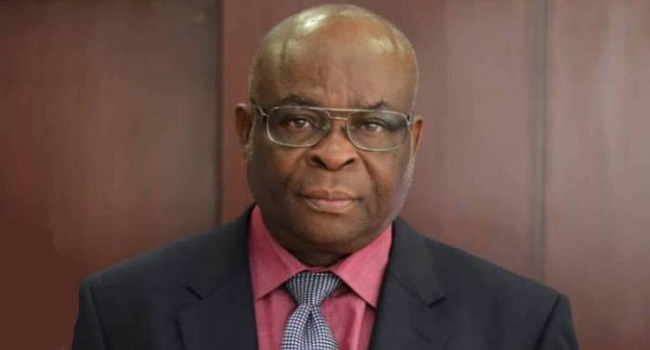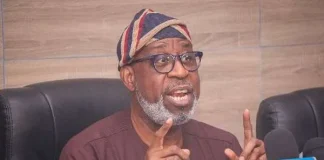🌿 Ruzu Non-Alcoholic Herbal Bitters
Ruzu Non-Alcoholic Herbal Bitters is a natural health supplement specially formulated to:
- ✅ Promote general wellness
- ✅ Detoxify the body
- ✅ Support the treatment of various ailments
Made from a powerful blend of 100% organic and medicinal herbs, Ruzu is completely alcohol-free, making it ideal for:
- 👪 All age groups
- 🌱 Health-conscious individuals
- 🌿 Anyone seeking non-alcoholic herbal remedies
Whether you're looking to boost your vitality, cleanse your system, or support healing the natural way, Ruzu Bitters offers a trusted herbal solution.
On Monday, the Court of Appeal, Abuja Division, discharged and acquitted former Chief Justice of Nigeria (CJN), Justice Walter Onnoghen, of a false assets declaration charge for which he was convicted and removed from office by the Code of Conduct Tribunal (CCT).
The Umar Yakubu Danladi-led CCT, in its April 18, 2019 verdict on the Federal Government’s fraudulent assets declaration case against Onnoghen, ordered the seizure of Onnoghen’s five bank accounts.
However, in a ruling given on Monday by Justice Abba Bello Mohammed, a three-member panel of Justices of the Appellate Court overturned the CCT’s decisions based on the conditions of the settlement struck between the Federal Government and the former CJN.
According to the appellate court, “Judgment is entered in the appeal as per the terms of settlement between the appellant and the respondent dated October 24” and ordered that all bank accounts with Standard Chartered Bank Nigeria Limited and assets seized from the former CJN be returned to him immediately.
In the terms of the settlement, all parties acknowledged that the CCT erred in convicting Onnoghen without first consulting the National Judicial Council (NJC), a body constitutionally competent to sanction Nigerian judicial officers.
Onnoghen, two of his lawyers, Chief Adegboyega Awomolo, SAN, and Dr. Ogwu James Onoja, SAN, approved the settlement terms, while the Attorney General of the Federation (AGF) and Minister of Justice, Prince Lateef Fagbemi, SAN, signed on behalf of the Federal Government.
Awomolo, Onnoghen’s lead attorney, revealed the terms of the settlement on October 24 but filed on November 1, which were confirmed by Tijani Gazali, SAN, who represented the federal government in Monday’s hearings.
Justice Abba Bello Mohammed, who chaired the panel of Justices of the Court of Appeal, declared the settlement conditions to be the court’s ruling.
In 2019, the CCT convicted Onnoghen on all six counts of violating the Code of Conduct for Public Officers presented against him by the federal government while serving as the head of the country’s judiciary.
Read Also: Senate Targets Eradication of Illegal Mining in Nigeria
In the lead judgment, Chairman of the CCT, Danladi Yakubu Umar, ordered Onnoghen’s immediate removal from office as CJN, as well as the removal of all previous offices he held, including Chairman of the NJC and Chairman of the Federal Judicial Service Commission (FJSC).
The tribunal also ordered the confiscation of Onnoghen’s five bank accounts and the funds in those accounts that he did not declare on his asset disclosure form to the Code of Conduct Bureau (CCB).
Although Onnoghen had been suspended since January 25, 2019 and had resigned on April 4 of the same year, the tribunal ordered his removal from office as CJN as well as chairman of both the NJC and the FJSC.
Dissatisfied with the CCT’s decision, Onnoghen filed an appeal with the Court of Appeal in Abuja on April 29, 2019, citing 16 reasons why his conviction by the Tribunal should be overturned.
On a variety of grounds, the former CJN petitioned the Court of Appeal to overturn and set aside the CCT verdict handed against him on April 18, 2019.
Read Also: Polaris Bank Clinches “Best Mobile App” Award at Digital Jurist Awards 2024
In his appeal, CA/ABJ/375 & 376 & 377/2019, Justice Onnoghen, through his lead counsel, Adegboyega Awomolo, SAN, sought the appellate court to overturn his conviction on the grounds of lack of jurisdiction, bias, and lack of a fair hearing.
Among other things, he claimed that the Danladi Umar-led CCT panel erred in law and caused a miscarriage of justice against him when it failed to decline jurisdiction to hear the six-count charge against him, and that the CCT Chairman should have recused himself from presiding over his trial.
In his seven-point reliefs, Onnoghen sought an order setting aside his conviction, quashing the order for seizure of his assets, and discharging and acquitting him of all charges leveled against him.
Contrary to the CCT conclusions, Onnoghen indicated that he did not admit to non-declaration of assets as a Supreme Court Justice beginning in 2005, and that he merely stated that he did not declare as required in 2009 because he forgot.
Onnoghen opposed the order for the confiscation of his assets on the grounds that they were properly acquired, contrary to the terms of paragraph three of Section 23 of the CCB Act, which only allows for the seizure of such assets “if they were acquired by fraud.”
He criticized the prosecution’s failure to introduce the petitioner, Denis Aghanya, before the tribunal whose petition resulted in the allegations against him.
argued that all of the claims filed against him “constitute no offence and should therefore not have formed the basis for his conviction”.
In a brief statement issued following the judgment, Onnoghen’s lawyers, Chief Adegboyega Awomolo and Chief Ogwu James Onoja, both Senior Advocates of Nigeria (SAN), expressed gratitude to President Bola Tinubu, the Attorney General of the Federation (AGF), and Minister of Justice, Lateef Fagbemi, SAN, for ensuring the issue was resolved and described the decision as historical and very significant.
Awomolo stated, “It is noteworthy because it restored the dignity, honor, and integrity of Honourable Justice Walter Onnoghen, the former Chief Justice of Nigeria.
“More important than His Lordship’s personal benefits is the fact that the damage done to the honour, integrity, dignity, and independence of the judiciary, the third arm of government under the Federal Republic of Nigeria 1999 Constitution, as amended, has been rebuilt and restored.
“Two decisions and acts by the Executive Arm of Government between 2016 and 2019 harmed the public perception, integrity, and independence of the court.
“The first was the assault of the homes of judicial authorities of the realm, including Supreme Court justices, in the early hours of the night, as if they were common criminals or robbers. It was stated that the judicial personnel had been accused of corruption. Finally, none of the judges who had been publicly humiliated were found guilty of any corruption allegations.
The second, according to the senior lawyer, was Onnoghen’s unlawful dismissal, which he described as a flagrant violation of Constitutional provisions, adding that the conduct of the Executive has no precedent or justification.
According to Awomolo, the two episodes have resulted in a negative public view of the judiciary, as well as a lack of faith in its integrity and independence.
















